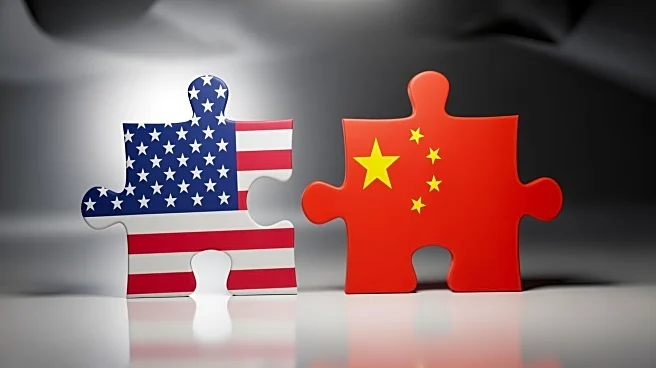What's Happening?
The U.S. has been increasingly reliant on trade with China, leading to strategic vulnerabilities in critical industries. The trade imbalance, with U.S. imports from China significantly outweighing exports,
has resulted in a substantial trade deficit. This dependency is particularly concerning in sectors like rare earth elements, which are vital for advanced technologies and defense systems. Recent Chinese export restrictions on materials such as gallium and germanium have disrupted global electronics supply chains, highlighting the risks of relying on a single authoritarian power for essential inputs. The pandemic further exposed these vulnerabilities, as American hospitals struggled to source protective gear from distant suppliers.
Why It's Important?
The overreliance on China for trade poses significant risks to U.S. economic and strategic autonomy. A single policy change from Beijing could impact U.S. defense manufacturing and clean energy industries, demonstrating the leverage China holds over critical supply chains. This situation also contributes to financial market volatility, as tensions between the U.S. and China can lead to abrupt political shocks affecting corporate earnings. Diversifying trade relationships with democratic, market-oriented nations could reduce these risks, offering greater predictability and stability for U.S. industries and investors.
What's Next?
Efforts to reduce dependency on China involve strengthening trade ties with democratic nations like Japan, Australia, and EU member states. These countries are investing in new supply chains for rare earth elements and other critical industries. The U.S. aims to reinforce domestic capacity in strategic sectors while building deeper trade relationships with trusted partners. This transition will require significant commitment and time, but it is essential for enhancing U.S. economic security and resilience.
Beyond the Headlines
The shift away from reliance on China is not about ending the relationship but rather about creating a more balanced and secure trade environment. By fostering open markets and shared rules, the U.S. can enhance innovation, inclusivity, and stability in global trade. This approach aligns with long-term security goals and helps insulate financial markets from geopolitical shocks.









